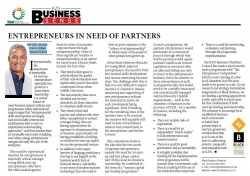
Entrepreneurs in need of partners - Mel Clark, Executive Director of Black Balance Projects
Internationally, the importance of mentorship for start-up entrepreneurs especially, has grown to a point where mentorship is a central feature of most business support policies and programmes. Many international experts argue that “entrepreneurial skills and expertise are largely tacit and socially constructed, and therefore have to rely on experiential action learning approachesâ€, and thus mentors have an invaluable role to play in helping new (often young) entrepreneurs navigate the early life cycle of the enterprise.
This need for experienced mentors for entrepreneurs is especially critical amongst young Black start-up entrepreneurs, who have the odds stacked against them in terms of economic empowerment through entrepreneurship. Some of these significant hurdles to entrepreneurship as an option for rural South African youth, include the facts that:
-
They tend to have gone to schools where the quality of their school education was significantly poorer than their counterparts from urban middle-class areas
-
The vast majority have never attended any tertiary education, let alone education in a business skills stream
-
They tend to have had parents and relatives who were either unemployed or earned a meagre living, thus not having opportunities for exposure to entrepreneurship or business, and certainly not having possibilities of relying on relatives for start-up capital for an entrepreneurial venture
-
In addition to the major barriers of language proficiency (having to use English in the business world), lack of financial literacy, and ability to use some of modern business technology, they also tend to have no prior exposure to the “culture of entrepreneurship†in which many of the youth of other groups have grown up.
Given these inherent obstacles for young Black aspirant entrepreneurs, the need for both fast-tracked skills development and intense mentoring becomes clear. The challenge with this is that it is very difficult to expect mentors to commit to intense mentoring and supporting of new entrepreneurs without the financial incentive for such involvement being significant. Even if funding for the consulting rates of the mentors were to be sourced, the mentors will arguably still need to have extraordinary interest and commitment to the entrepreneur and his/her venture.
This conundrum leads to the idea that the two needs of aspirant entrepreneurs, namely the need for (a) startup and first-phase capital, and (b) the need for intensive mentorship, be combined in the form of a “venture capital partnership programmeâ€.
In such a programme, the aspirant entrepreneurs would participate in a structured process through which they will be partnered with equity partners (small scale venture capitalists or investors) who are able and willing not only to invest in the entrepreneurs business, but to be mentors to these entrepreneurs as well.
A programme like this would need to be carefully structured and systematically managed and facilitated by credible organisations â€" such as the chambers of business in the province of KZN - for a number of reasons, including the following:
-
There are notable risks of exploitation
-
There is a need for an independent “match-maker†to link entrepreneur and investor/mentor
-
There is a need for good governance and accountability
-
It is highly probable that funding for the implementation of the programme will be sourced from Government, and thus accounting for the use of the funds becomes important
-
There is a need for monitoring, evaluation and learning through the programme implementation.
The KZN Business Chambers Council has made a start towards such a programme with “The Entrepreneur Competition†which is now running in a few local chambers, but this start needs to be grown in scale. In our research and strategy formulation assignments as Black Balance, we are finding a growing appeal from youth, especially in rural areas, for this combination of both start-up funding and mentorship. We continue to encourage local established business and Government to build their partnerships to nurture grassroots entrepreneurship as it is one of the keys to addressing poverty, inequality and unemployment in KZN.
Black Balance Projects
Tel: +27 (0)31 832 3450
E-mail:
cnarain@blackbalance.co